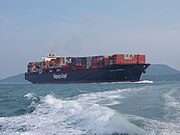Hong Kong Fir Shipping Co Ltd v Kawasaki Kisen Kaisha Ltd
| The Hong Kong Fir | |
|---|---|
 |
|
| Court | Court of Appeal |
| Full case name | Hong Kong Fir Shipping Co Ltd v Kawasaki Kisen Kaisha Ltd |
| Citation(s) | [1962] 2 QB 26, [1961] EWCA Civ 7, [1962] 1 All ER 474 |
| Transcript(s) | Full text of judgment |
Hong Kong Fir Shipping Co Ltd v Kawasaki Kisen Kaisha Ltd [1961] EWCA Civ 7 is a landmark English contract law case. It introduced the concept of innominate terms, a category between "warranties" and "conditions".
Under the English sale of goods principles, a condition is a term whose breach entitles the injured party to repudiate the contract, but a breach of warranty shall give rise only to damages. In this case, Diplock LJ proposed that some terms could lead either to the right to terminate a contract as a remedy, or to the mere entitlement to damages (without a right to terminate). What mattered was not whether a particular contract term was called a "warranty" or a "condition", but how serious was the breach of the term.
In short, the test for whether or not one may repudiate has now become, "does the breach deny the claimant the main benefit of the contract?" However, modern commercial custom has since established that some breaches, such as failure to meet a "notice of readiness to load" a sea cargo, will always be repudiatory.
Hong Kong Fir Shipping hired out their elderly ship, the "Hong Hong Fir", under a two-year time charter-party to Kawasaki Kisen Kaisha. It was to sail in ballast from Liverpool to collect a cargo at Newport News, Virginia, and then to proceed via Panama to Osaka. A term in the charterparty agreement required the ship to be seaworthy and to be "in every way fitted for ordinary cargo service." However the crew were both insufficient in number and incompetent to maintain her old-fashioned machinery; and the chief engineer was a drunkard. On the voyage from Liverpool to Osaka, the engines suffered several breakdowns, and was off-hire for a total of five weeks, undergoing repairs. On arrival at Osaka, a further fifteen weeks of repairs were needed before the ship was seaworthy again. By this time, barely seventeen months of the two-year time-charter remained. Once in Osaka, market freight rates fell, and Kawasaki terminated the contract citing Hong Kong's breach. Hong Kong responded that Kawasaki were now the party in breach for wrongfully repudiating the contract.
...
Wikipedia
